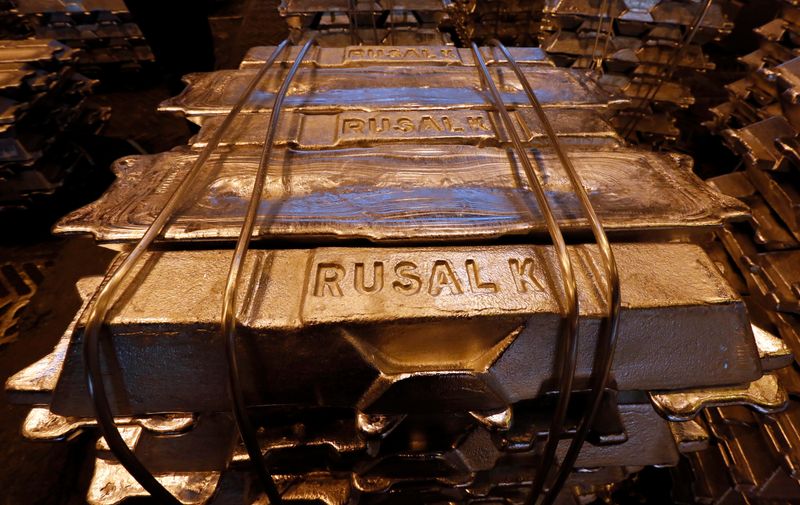LONDON (Reuters) - Global aluminium prices soared after news the Biden administration is considering an effective ban on Russian imports of the metal used in transport and construction.
Below are the potential scenarios and consequences of any U.S. curbs.
WHAT IS BEING CONSIDERED?
The White House is looking at banning Russian imports, raising tariffs on Russian aluminium to levels so punitive they would constitute an effective ban, as well as sanctions on Rusal.
Rusal is the world's largest aluminium producer outside China, supplying the world with 6% of its needs estimated at around 70 million tonnes this year.
GREATER IMPACT IF RUSAL SANCTIONED
The impact would be greater if sanctions were imposed on Rusal rather than on aluminium shipments because Rusal is not only a major producer, but involved in a web of global supply chains for raw materials needed to make the metal, bauxite and alumina.
President Donald Trump imposed sanctions on Rusal in 2018, but the global consequences led them to be lifted less than a year later.
The upheaval affected operations in Guinea and Jamaica, smelters in France and elsewhere struggled to secure raw material supplies and the Irish government considered intervention to safeguard jobs at Rusal Aughinish Alumina, Rusal's largest producer of the interim product alumina.
HOW MUCH RUSSIAN ALUMINIUM DOES THE U.S. IMPORT?
Rusal results show it produced 1.89 million tonnes of primary aluminium in the first half of 2022, with Europe its biggest customer accounting for 40% of sales revenue.
It said in March Western sanctions could delay investment and hit profitability and said in August costs had soared due to the conflict.
Last year, U.S. imports of Russian aluminium were 242,000 tonnes, accounting for 4.4% of U.S. demand, Morgan Stanley (NYSE:MS) said in a note.
U.S. imports of Russian aluminium have increased this year, rising by nearly a fifth in the first seven months to 146,553 tonnes, according to trade data compiled by Reuters from the United Nations Comtrade database.
PRICE RESPONSE
When the news of a possible U.S. ban emerged on Wednesday, the benchmark price on the London Metal Exchange spiked 7% to $2,400 a tonne, but retreated from the highs and was trading around $2,370 on Thursday.
That is down 42% from a record peak of $4,073.50 touched in early March when the market first feared that Russia's invasion of Ukraine would spur sanctions and reduced supply.
All industrial metals prices have slumped in recent months on expectations a global recession would curb demand, so prices are unlikely to revisit the record, analysts say.
In 2018, when U.S. sanctions hit Rusal, LME prices soared by 35% in less than two weeks to $2,718 a tonne, the highest in nearly seven years.
WHAT HAPPENS TO RUSSIAN METAL?
Rusal might be able to redirect flows from the United States, but sanctions could make other buyers wary of taking the material, analysts said.
Some companies such as Novelis and Norsk Hydro have rejected Russian metal for next year's contracts, while other consumers are considering their options.
The LME last week launched a discussion paper on the possibility of banning Russian aluminium, nickel and copper from being traded and stored in its system.
China, the world's biggest aluminium producer, is likely to be the main destination for Russian metal under U.S. sanctions.

"China could decide to take more readily available, and appropriately discounted, Russian units, while exporting its own metal to other markets, including to the West," said analyst Edward Meir at ED&F Man.
Significant volumes of unwanted Russian-origin copper have been deposited in LME approved warehouses in Germany, the Netherlands and Taiwan since the middle of September, two sources familiar with the matter said.
